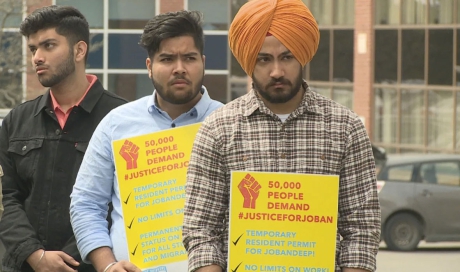Letters
You are here
Migrant Students in Canada: An organizing force to be reckoned with

November 17, 2022
In the past few weeks, the education sector in Ontario has been witnessing a gamut of capitalist reactions to the organizing power of workers in the province. Simultaneously, then, it has also witnessed the solidarity of different workers coming together to preserve the right to protest and organize for affordable and dignified living. As an international student-worker, the fight for education sector workers to be empowered is very much resonant with the plight and conditions of migrant-student-workers.
As student-workers who have witnessed tuition hikes, dangerous working circumstances as “essential” workers in the pandemic and a 7% inflation rate, migrant-students understand the vagaries of the increasing privatization of education and its effects on education workers. Migrant students, much like education workers themselves, have never been able to separate a learning environment from a working environment--we are poised as both students and workers to understand that any educational institution is also a workplace. Moreover, migrant students particularly work both on campus and off campus— we are your grocery packers, shoppers, Uber drivers, restaurant line cooks, care workers and cleaners. We thus understand that it costs to get educated and to educate.
However, working as students has always been much more of an uphill task for migrant students—we are legally allowed to work only 20 hoursoff campus. This unfair restriction on our permits is advertised to us as a goodwill act done to secure more learning hours as students. But, this idealistic denominator is precisely that—far removed from the material, everyday conditions of working lives of students. Take for example, one can simply start with this question to see the unfairness of this restriction: how can most available part-time jobs be strictly 20 hours if we take into account an average 8 hour work week for 3 days?
Students are thus automatically forced into exploitative workplaces precisely because of the threat of “illegal” working hours looming over our heads. Jobandeep Singh Sandhu, a fellow migrant-student worker, was deported for the reasons of not being able to stick to this restriction, in 2019. Many international students who are unable to work enough to get paid enough, are continually reported to resort to food banks, exploitative work conditions and dangerous living conditions. This is all because of the unfair limits on how we can support ourselves and our dear ones.
But none of these injustices go unfought for. Migrant Students United, a chapter of Migrant Workers Alliance for Change, started organizing around the removal of this restriction with a petition to keep Jobandeep inside Canada, which eventually turned into a larger campaignabout a full-fairness agenda for international students. One of the recent wins of migrant student organizing has been the partial removal of the 20 hour work limit up until December of 2023. While some may see this as just a bandaid response to labour shortage, migrant student-workers see this as both a revelatory sign and an even more telling opportunity. This victory is a sign of how this restriction was always removable regardless of the present motivations of the government. And second, this partial win is an opportunity for us to fight for the permanent removal of this unfair, unjust and exploitable restriction. The removal of such arbitrary working restrictions empowers the migrant workers, gives them more room to make decisions that support their working lives best, and opens more opportunities for them to be able to survive the realities of being a student in Canada.
Currently, migrant students are organizing against the unfair costs to be borne within the education sector. While Migrant Students United is working towards the demand of a complete, permanent removal of the work restriction over other fairness demands, Ontario College Student Associations has launched the #NeedorGreed Campaign, asking for a complete tuition freeze and tuition parity for international students. We, as socialists, must continue to see how treating international students as cash cows is tied to austerity measures of the government, signified through massive education budget cuts. Increasing corporatization of education is thus producing a series of antagonisms: of the interests of the domestic elite and the needs of (disproportionately) racialised migrant student-workers, of the underpaid education worker and the exploited migrant student and so on.
We need to continue to organize around these contradictions as critical points of solidarity. This is already being demonstrated by educators and migrant students coming together to fight for each other's rights. While we continue to stand in solidarity with bargaining educators fighting for fair contract, we have also received unparalleled support from educatorsfor undocumented and low-waged migrants to be granted permanent status in Canada.
Thus, without going into despair, we need to continue to see how profit-motivated designs may invite racialised migrant workers into an exploitative “Canadian” dream as mere revenue generating numbers. But, the economic interests of the capitalists cannot calculate how living, breathing workers are challenging the unfair terms of this dream for securing better, more just futures.
And we are just getting started.
Section:










